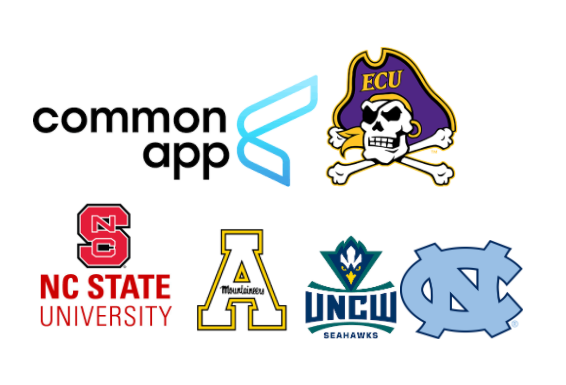Applying to college is easier than you think: advice from a high school senior

Amidst college decision season, many juniors are anticipating starting their college admission process this fall. Unfortunately, many of them don’t know everything the process entails, or even where to start. Students planning on applying to college in just a few months have countless questions that need to be answered for them to comfortably begin the process.
On Tuesday Feb. 23, juniors will take the ACT test. Considering the unusual circumstances of this school year, juniors feel more unprepared than ever before.
“I’m worried about scores obviously, and I know I should submit them to colleges; but I’m scared that I didn’t prepare enough. If we had more study materials or sessions [from the school], it would help,” junior Bella Melendez said.
To help feel better prepared for the test, you can find plenty of study materials, video lessons, and practice tests online through sites such as PrepScholar, The Princeton Review, and Khan Academy. If one-on-one instruction is more in line with your personality, seek a private tutor or consultant. The ACT Validity and Efficacy Research Department at ACT found that working with these individuals for 11 or more hours can result in a “statistically higher ACT Composite re-test score than those who did not spend any hours” in one-on-one tutoring.
If after taking the exam you are not satisfied with your score, you should schedule a retake. According to Score gains on retesting with the ACT assessment authors K.M. Andrews and R. L. Ziomek, “Retesting has shown a 1 to 2 point scale score increase.” Visit act.org to register for your retake but try to schedule it for at least three weeks before the college admission deadlines to allow time for the scores to be released.
College admissions officers will look not only at your test scores but at your grades and classes as well when considering your application. Each college requires a transcript that your counselor will send along with your application. They will take into consideration the difficulty of your classes and your GPA. The three different class rigors, college prep, honors, and AP, affect your weighted GPA in different ways. Colleges look at both the weighted and unweighted GPAs of each student.
“I know a little about honors classes because I am taking honors, but I am trying to take AP classes next year and I don’t know much about it. I’d like to know what it means and how it helps your GPA,” junior Daniel Mendez said.
College prep classes have the smallest effect on your weighted GPA, while AP classes have the most; however, they all have the same effect on your unweighted GPA. AP classes are at college level difficulty and require you to take a specialized exam through Collegeboard to receive credit for the class.
Caution, though: AP classes may be recommended for you, but don’t bite off more than you can chew. According to Kaplan, “Many colleges would rather see a B in an Honors or AP course than a higher grade in a regular college prep course. They want to see that you are truly challenging yourself but that you are still mastering the material. If you’re getting C’s or D’s in the class, you clearly aren’t mastering the material and should rethink your placement in the course.”
When it comes to actually applying to schools, you should follow a few basic rules to decide where to send your application.
“I don’t know exactly where to apply. You have to have a lot of options, so I want to make sure I pick the right options for the career I want to go into,” junior Hannah Burris said.
According to Yale.com, when choosing your future college you should consider long-term goals, location, student body, cost, and selectivity. At the start of your senior year, once you have a basic idea in mind of what kind of school you want to go to (i.e private vs public, university vs liberal arts college, in-state vs out of state), figure out your stats, which include GPA, test scores, and extracurriculars, and find out which schools are in the safety, target, and reach ranges. Safety schools are schools that are sure to accept you, target schools are schools that you have a 20% to 80% chance of getting into, and reach schools are schools that you are unlikely to be accepted into.
According to CollegeVine, a website for calculating your chances of getting into a certain school, the list of schools to which you are applying should be made up of 25% safety schools, 40% target schools, and 35% reach schools.
The easiest and most primary method for applying to college is through Common App. Over 900 colleges in the country are part of Common App, including all eight Ivy League schools.
“Questions about Common App? I don’t even know what that is,” Mendez said.
Common App is an application form that you can send to multiple colleges at once without having to fill out multiple applications. General input such as your basic profile, education history and extracurricular activities only has to be recorded once.
After you add your colleges of choice to Common App, you may have to complete additional essay questions or writing supplements depending on a prospective school’s requirements. Some additional essays are optional, but according to International College Counselors, “Optional essays may help schools differentiate between students with similar qualifications. Writing the optional essay demonstrates that a student has initiative and is serious about attending.”
“I don’t even know what I’m going to write my college essay about. It stresses me out so much because I know that’s a big part and it can make or break your application,” Melendez said.
The personal essay is your way to appeal to college admissions officers in a way that numbers and scores can’t. Common App provides seven prompts to choose from to get you started, but you can write about anything that helps the admissions officers get to know you and want to accept you.
When applying to schools that are not in the Common App, though, be sure to check for any specific prompts. Some topics to avoid, according to Fastweb, are the most common ones like sports injuries, mission trips and tragedies. Make sure your essay focuses on your development as a person and doesn’t lack depth.
Everyone has a dream, and a college education might be your first stepping stone to achieving it. Some people’s dreams even include a specific college.
“I want to go to UNC Chapel Hill. I’m a huge Tarheels fan and it’s always been a dream for one of my family members to go, so it’s a big deal to us,” Burris said.
UNC Chapel Hill’s first application deadline for early decision and early action applicants is Oct. 15. The regular decision deadline is Jan. 15. The UNC public school system and many other colleges operate on a similar schedule with deadlines spanning from October to February every year.
The Common App for Fall 2022 applicants will open on Aug. 1, 2021. Now that you know everything you will need for a smooth and speedy process, it is never too early to get started! Good luck!

My name is Samantha Pelles and I'm a senior! I am Co-Editor in Chief of the Spartan Shield and I have been on staff since sophomore year! I love movies,...


